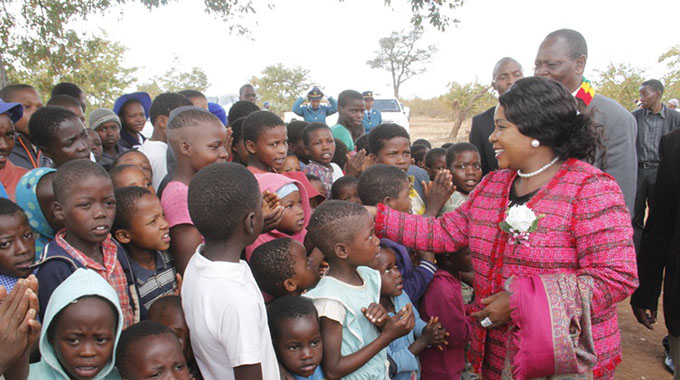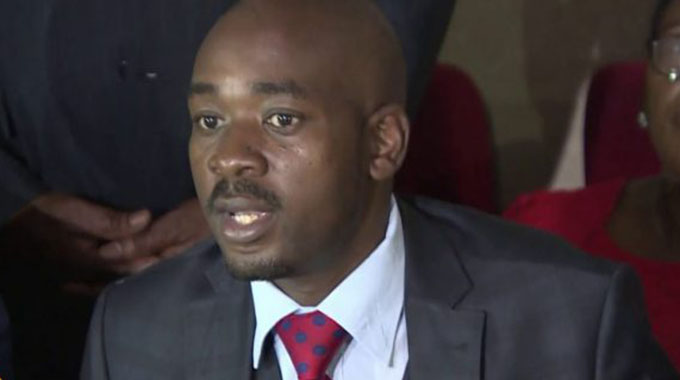Mai Mnangagwa’s date with the San

Tendai Rupapa Senior Reporter
FORTY-FIVE families live under crowded and squalid conditions in Makhulela area, Thwayithwayi village under Bulilima district, 120km out of Plumtree town.
In this part of Zimbabwe, at least eight to 10 family members share one small hut whose roof is made of grass, walls of tin-moulded mud “bricks”.
In a family, a father, mother, two daughters, four sons and two grandchildren share one thin and torn blanket in a single room.
Similar huts are dotted around the area, most of them with no doors while some are incomplete. The whole community does not have toilets.
Their children do not go to school. The villagers do not have goats, cattle or donkeys. The majority of them do not have national identity documents and birth certificates hence they do not know their ages. They are just poor.
Such has been the life of the San people, commonly called bushmen, one of Zimbabwe’s most marginalised communities.
Here over 400 San people reside and take each day as it comes.
They say they have been staying in the area since 1993 after they were “taken” from the bushes by a woman they identified only as Mrs Matondo.
Living under the dominance of the Kalanga and Ndebele people, the San are reluctant to share their world with other ethnic groups, accusing them of being hostile and mean to them. They are not really “good friends”.
It is a Monday morning and the Kalanga-speaking community — men, women and children — are gathered at an open space.
They are singing, showcasing their dancing skills while others ululate. The sound from their unique musical instruments of clattering hoes with metal bars is exciting.
They are waiting for the arrival of a rare guest, the mother of the nation, First Lady Auxillia Mnangangwa.
To them the visit is a first of its kind. It is their first time to see someone from a high office stepping on their land, let alone the First Lady. They have never seen or heard of her before.
Speaking to them is difficult and we enlist the services of Bulilima rural district council chairman Mr Morgan Ndebele.
In an interview before the arrival of Amai Mnangagwa, an ecstatic village head Mrs Matjena Ncube said Mrs Matondo, whom they do not know much about, took them from the bushes. She used a lorry to ferry them to their new home.
“Mrs Matondo used to visit us in the bushes and would bring porridge for our children and also started a crèche for them and would frequently visit and teach our children. She later came with a lorry and said she was relocating us. We were hesitant at first but later gave in and we were brought to this area.
“We are 45 families and each family has between three and 12 members,” said Mrs Ncube as she took us around her community.
At the Sibanda homestead, eight family members share a small mud hut.
A black sickly dog, wagging its tail continuously, ushers us into the yard where a 32-year-old man – Fanisani – is boiling few grains of maize (popularly known in Shona as mangai) in a dirty small pot.
We learn this was the only meal of the day for the whole family and he had been given the maize by a Kalanga family as payment for working in their fields.
Fanisani said he literally has never seen the door of a classroom and does not have identity documents.
“I stay here with my mother, brothers and sisters together with their children and we all sleep in this hut. To us, it is normal because we have been staying under such conditions for a long time.
“However, it is my wish to see the Government intervening and building houses, schools and clinics for us. We also need identity documents to enable us to look for employment elsewhere,” he said
He is too poor to marry, even if offered a free wife he will not take her.
“I have nothing to offer, I cannot even afford to marry from the next Kalanga community. If a San man tries his luck on a Kalanga woman, the first question he is asked is what he has to offer. We are just poor, we have no goats, no cattle, we have nothing,” added Fanisani.
Mrs Ncube, who is married to a Kalanga despite the “bad blood” between the two tribes, says the San people work for other tribes doing manual jobs for them to get a meal for the day and sustain their families.
The beautiful light-skinned Mrs Ncube said after getting married to a Kalanga man, she refused to move to his community prompting him to “elope” to the San community. They have seven children together. It was time to go back to the open space as the singing was growing louder, a sign that the First Lady’s convoy was now in the area.
Fanisani was hesitant to go and meet the First lady saying his clothes were old and dirty hence he was not fit to get closer to the wife of the Head of State.
It took Mrs Ncube some time to convince him that the First Lady was not on a “royal” visit but had visited as one of them. He later agreed to join the gathering.
When the First Lady finally arrived, the whole community was jubilant and Mrs Ncube took her around opening up their way of life. Mrs Ncube said ever since they moved from the “ancient world” in 1993, it was their first time to be visited by someone from a higher office, let alone the First Lady. She expressed her gratitude on behalf of the whole community.
While at her homestead, Mrs Ncube further told the First Lady of the challenges they were facing as a community.
These include a shortage of schools, health care facilities, and poor rainfall. As a result of bad rains, the community requires irrigation schemes, farming inputs and equipment among others.
The First Lady said the challenges being faced by the San community were similar to those faced by the Doma community in Kanyemba.
“What I have seen here is not so different with what I saw in Kanyemba. Their standards of living are the same. They do not have anything and they urgently need help,” said Mrs Mnangagwa.
She appealed to Government ministries responsible for the welfare of people, water, sanitation and road rehabilitation to urgently assist as the situation was dire.
The First Lady also said the needs of the less privileged people motivate her to continue advocating for the betterment of their social and economic needs.
“My wish and passion stems from the way I grew up. I had a similar upbringing so I wish to assist others in similar conditions for them to have a better life. My wish is for God to help me so that my dreams to see a better life for these people are achieved,” she said.
After touring the community, the First Lady then handed over a borehole which was drilled for the community with her assistance.
“I have come to interact with you as a mother, daughter and granddaughter so that I get to know you and your way of living so that I will know how best I can assist you.
“I have noticed that a lot needs to be done here so that you live like anyone else. I don’t want you to live in isolation, you must interact with others,” she said.
She encouraged women to start some projects like gardening where a solar powered borehole will be put in place for irrigation. She further urged the San women to desist from giving birth at home and use the nearby clinic adding they should also get checked and screened for cancer. The First Lady donated groceries, clothing, blankets, books and toys for the children, bringing smiles to the beautiful faces of the San.
They thanked the First Lady for her kindness and love.
In an interview, Tjipabi Moyo and her daughter Tjilani could not hide their joy.
The elderly Tjipabi, who shares a hut with her eight children whose ages she does not know said, “We are on cloud nine, we have been remembered finally. This has never happened to us.
“We always felt neglected and looked down upon as our socio-economic needs were not being catered for like other tribes but today we want to thank the First Lady Amai Mnangagwa for visiting and giving us a ray of hope.”
Tjilani who has two children said she was not so sure of her age estimating that she was aged between 18 and 21, neither does she know the age of the father of her children who stays elsewhere with his parents.
Another man, Mavuka Tshuma who has two huts at his compound which he shares with his wife – Sithokozile and eight children – said he has a small piece of land where he grows sorghum and maize.
“What our mother has done for us is something that will linger in our minds for a long time. We appreciate her visit and what she has given us.
“We have nothing here. We were once given cattle by a certain non-governmental organisation but the Kalanga took them away from us, they stole them while some died of hunger. They are mean to us and they look down upon us,” he said.
Another couple, Simbalux and Simangele Mpofu, urged the Government to intervene and assist them adding that they were willing to engage in self-empowering projects but lacked the capacity.
“Please visit us again, we now feel that we are human beings just like you, so please don’t forget us,” Simbalux said.
As the First Lady waved goodbye, the San people kept looking in the direction of her convoy until when they could not see the dust.
Indeed the First Lady will be remembered in this community and by the country as a whole because of her love and kindness. She brought smiles and a ray of hope to the San community through her Charity foundation — Angel of Hope.
What a day it was!









Comments